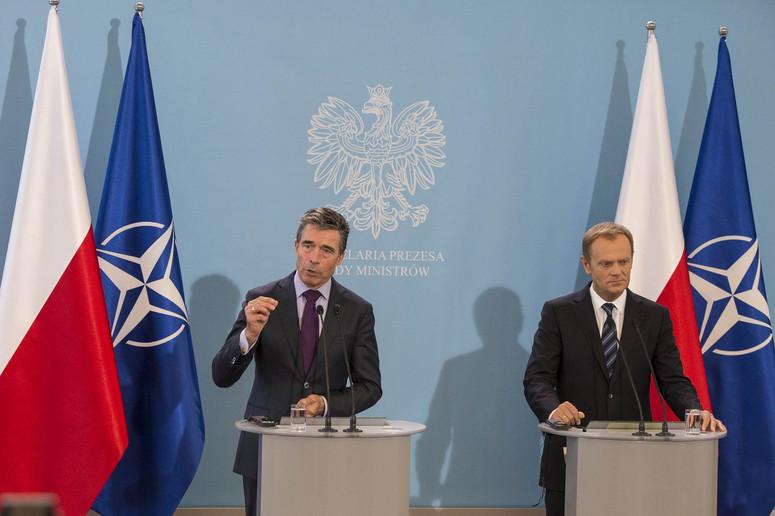 The NATO summit in Newport, Wales has come and gone. It surely ranks as one of NATO’s better efforts, reviving the core principle of European defence and committing alliance members to expanded defence spending. But for eastern European members of the alliance, there’s an uneasiness about their strategic future. Some in Poland and the Baltic states will see NATO’s expanded ready-reaction force as too little, too late. Perhaps aware that the summit would not be giving those alliance members all they wanted, President Obama stopped by the Estonian capital on his way to Wales. Still, concerns that Russia aims to create a ‘grey zone’ between its national border and western Europe haven’t been assuaged.
The NATO summit in Newport, Wales has come and gone. It surely ranks as one of NATO’s better efforts, reviving the core principle of European defence and committing alliance members to expanded defence spending. But for eastern European members of the alliance, there’s an uneasiness about their strategic future. Some in Poland and the Baltic states will see NATO’s expanded ready-reaction force as too little, too late. Perhaps aware that the summit would not be giving those alliance members all they wanted, President Obama stopped by the Estonian capital on his way to Wales. Still, concerns that Russia aims to create a ‘grey zone’ between its national border and western Europe haven’t been assuaged.
Poland, the largest of the former communist nations in the NATO alliance, has spent months pushing for greater NATO efforts in the east. In April, Polish Prime Minister Donald Tusk and Foreign Minister Radek Sikorski argued for 10 000 NATO troops to be permanently stationed near Poland’s eastern border to deter Russian aggression. After Wales, Poland can look forward to an increased rotation of NATO and US troops through NATO headquarters in Szczecin, in north-west Poland, but not the permanent stationing it sought.
NATO member states, though, were always divided over Poland’s request—condemned too by Russia—saying that such a deployment would violate the ‘Founding Act on Mutual Relations, Cooperation and Security between NATO and the Russian Federation’ of 1997. With Germany worried about provoking Russia, such action so close to the Russian and Ukrainian borders may be seen by Moscow as a breach of NATO’s pledge not to station troops, nor deploy nuclear weapons in new member states (Poland joined NATO in 1999). The Poles, in turn, argue that Russia violated that agreement by entering the Ukraine.
In 1997, then Deputy Defence Minister Andrezj Karkoszka remarked in relation to a conference between Bill Clinton and Boris Yeltsin on NATO expansion that ‘the smell of Yalta is always with us’—a reference to the 1945 conference that essentially created the Iron Curtain, leaving Poland feeling betrayed by the West. The present sentiment is more uneasiness than betrayal, but turns upon a feeling that NATO delivers unequal protection to its members. That uneasiness is especially acute during a time when Poland feels vulnerable. ‘It is very important that all members should enjoy the same level of security’, said Mr Sikorski. ‘Poland has been a member of NATO for 15 years now—and so far the only permanent military institution that we have is a conference centre, training facility. We would welcome a prominent, major presence.’ Asked about his aspirations before the Welsh summit, he said: ‘We are hoping that the NATO summit…will take important decisions to persuade us that Article Five of the Washington Treaty stands not only legally, but in terms of capability to enforce it in practice, which is what it’s all about.’ Prime Minister Donald Tusk also expressed frustration over NATO’s hesitancy: ‘We are gaining something step by step, but the pace of NATO increasing its military presence [in Poland] could be faster’.
Added to that, leaked tapes of a conversation between Sikorski and Jacek Rostowski, a Polish politician and former Minister of Finance, have the Foreign Minister speaking much more forthrightly: ‘You know that the Polish-US alliance isn’t worth anything…It is downright harmful, because it creates a false sense of security…Complete bullshit. We’ll get in conflict with the Germans, Russians and we’ll think that everything is super…Losers. Complete losers.’
Poland’s requests fell on sympathetic, but critical, ears in Newport. NATO and the US pledged to increase military exercises and continuous rotation of troops, as well as the ‘rapid response plan’ that can be deployed ‘on very short notice’ if a Baltic state were to come under attack. In response, President Komorowski, Sikorski and Polish Defence Minister Siemoniak weren’t entirely satisfied, but put on brave faces in public. In a recent opinion poll, 59% of Polish respondents reported feeling that Russia is a threat to their security. And Poland doesn’t have a wide range of possible security guarantors.
Some NATO members probably believe the Poles are exaggerating the threat. Russia, after all, has not indicated any intention to go after Poland. The country doesn’t have a large Russian-speaking population for Moscow to ‘protect’ and there’s little to tempt Russia to attack a NATO member with, in theory, guaranteed assistance from the West. If anything, a downturn in the economic relationship with Russia and a long, cold winter might currently be Poland’s largest security threat.
Penelope Czyzewska is currently completing a degree in national security, and is undertaking work experience at ASPI through the University of Canberra. Image courtesy of NATO.